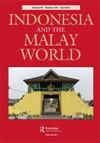Colonial Legality in Sumatra
IF 0.9
3区 社会学
0 ASIAN STUDIES
引用次数: 1
Abstract
ABSTRACT The literature on the law of the colonial archipelago and the Malay-speaking world more broadly, has recently shown that colonial law was a highly fragile system, that was co-constructed by colonisers and colonised elites, and litigants. It has been convincingly argued that a variety of actors inside and outside colonial courts as well as multiple political discourses, contributed to the making of colonial legality in Java and the Straits Settlements. I propose that a turn to ontology which has recently been espoused by a number of anthropological contributions could help further explore this notion of fragility in the archipelagic world. Such an ‘ontological turn’ would allow us to closely examine the carriers of knowledge themselves, namely colonial archival documentation, and how these contributed to, but hid, the fragile nature of law. Specifically, I analyse written exchanges between Dutch colonial administrators and academics about an adat-based Muslim divorce case from Tapanuli in Sumatra, that documented how law in the Dutch East Indies was constructed through the written form and the creation of epistemic absences in the colonial archive. With ontological intervention, I argue, we can engage more deeply with such power-laden archival documentation, and recognise more thoroughly the multiple factors involved in the construction of colonial law. Moreover, a turn to ontology has the potential to disrupt our own analytical repertoire used to apprehend forms of law and sociality, undermine truth claims of the colonial archive, and produce new concepts to consider.苏门答腊的殖民合法性
最近,关于殖民地群岛和更广泛的马来语世界的法律文献表明,殖民地法律是一个高度脆弱的系统,它是由殖民者、被殖民精英和诉讼当事人共同构建的。令人信服的论点是,殖民法院内外的各种行动者以及多种政治话语对爪哇和海峡殖民地的殖民合法性作出了贡献。我建议转向最近被许多人类学贡献所支持的本体论可以帮助进一步探索群岛世界的脆弱性这一概念。这种“本体论转向”将使我们能够仔细研究知识的载体本身,即殖民档案文件,以及它们如何促进但隐藏了法律的脆弱本质。具体来说,我分析了荷兰殖民管理者和学者之间关于苏门答腊岛Tapanuli穆斯林离婚案的书面交流,该案件记录了荷属东印度群岛的法律是如何通过书面形式和殖民档案中认识缺失的创造来构建的。我认为,通过本体论的干预,我们可以更深入地研究这些充满权力的档案文件,并更彻底地认识到殖民法建设中涉及的多重因素。此外,转向本体论有可能破坏我们自己用来理解法律和社会形式的分析技能,破坏殖民档案的真理主张,并产生新的概念来考虑。
本文章由计算机程序翻译,如有差异,请以英文原文为准。
求助全文
约1分钟内获得全文
求助全文
来源期刊

Indonesia and the Malay World
ASIAN STUDIES-
CiteScore
2.00
自引率
0.00%
发文量
17
期刊介绍:
Indonesia and the Malay World is a peer-reviewed journal that is committed to the publication of scholarship in the arts and humanities on maritime Southeast Asia. It particularly focuses on the study of the languages, literatures, art, archaeology, history, religion, anthropology, performing arts, cinema and tourism of the region. In addition to welcoming individual articles, it also publishes special issues focusing on a particular theme or region. The journal is published three times a year, in March, July, and November.
 求助内容:
求助内容: 应助结果提醒方式:
应助结果提醒方式:


